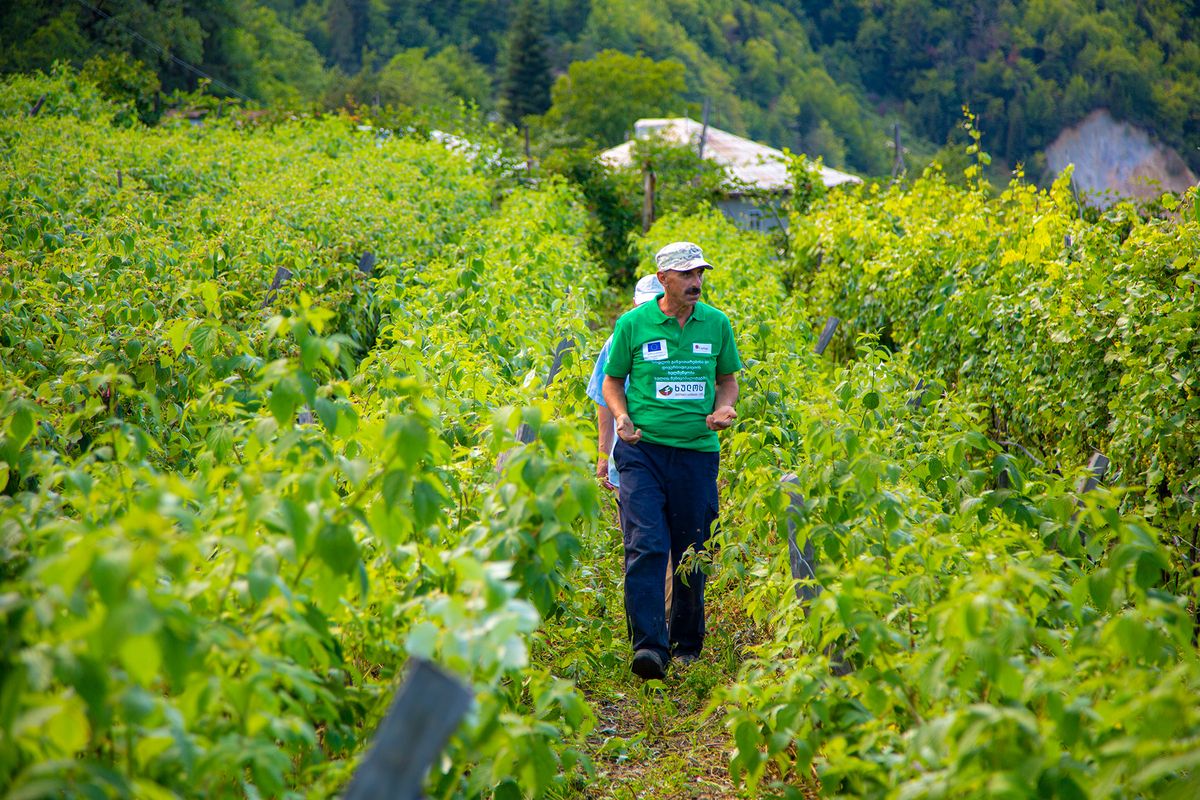
My Village: Growing Berries in the highlands of Adjara
The EU-supported Khulo LAG promotes local production
The village of Dioknisi that belongs to the municipality of Khulo is located by the Batumi-Akhaltsikhe highway, at 1180 meters above sea level. About nine years ago, when the locals were still managing farms inherited from their ancestors, Guram Dzirkvadze decided to cultivate a berry field in addition to his vinery, where he grows 15 varieties of grapes. At first, his initiative was viewed with suspicion, because there had been no tradition of growing berries in the municipality, so Guram’s initiative was a novelty. Guram decided to take the risk after connecting with the EU project. He engaged in a grant competition announced by the Khulo Local Action Group (LAG), received funds, consultations and technical assistance. Guram invested a lot of hard work and today he is a country-known producer of high-quality berries.
“At first we faced a lot of challenges, but my wife and I were resolute to handle them step by step. With EU’s support, we received theoretical knowledge and gained practical experience from the very beginning. We went to various trainings, visited gardens in Eastern Georgia and collected information. Thanks to the knowledge and experience accumulated over the years, we can now boast of being experts in the region, which is a great responsibility,” says Guram.
Guram Dzirkvadze’s berry field is one among the 73 initiatives funded by the Khulo LAG so far. These initiatives have fully transformed both economic and social life in the municipality over the past three years. “Khulo has grown a lot, civic awareness has improved, people are more active and try to be engaged in the development of the municipality. At this stage, 75 people are part of the Khulo LAG, all of them trying to benefit the municipality with their involvement”, says Aslan Tunadze, a member of the Khulo Local Action Group.
From the inception of the EU project, the Dzirkvadze family knew they had to involve other people, because the climate of the Adjarian highlands is beneficial for growing quality crops with lower costs and fewer efforts. Consequently, they started sharing seedlings and thus helped the villagers start their own farming activities. Currently 48 families in Khulo are employed in this business thanks to Guram and Khulo LAG.
“There are small land plots in Khulo, so it is more profitable to grow grains than to cultivate potato there. In addition, due to the local climate, we do not have spray crops, so our product is eco and healthy. That helped identify the ambitious goal of establishing ourselves at the market, and we succeeded, capturing 100% of the market in Adjara by October. With EU’s support, we have been able to brand the product and sell dozens of kilometers away, with the help of a refrigerator van. The refrigerator also helps reduce product losses, keep it fresh, and ultimately deliver the product to consumers in compliance with other norms of hygiene and food safety,” Dzirkvadzesays.
The EU-funded project also helped the Khulo LAG to build an irrigation system on the plot to boost the use of resources. According to the Dzirkvadzes, they are going to sell up to 20 tons of berries this year, an amount sufficient to supply the whole of Adjara. The Dzirkvadzes are proud to offer customers the best quality berries, and appreciate the vital role of the EU project and Khulo LAG. Guram is convinced that without the LAG, the farming would have been harder and they could not have employed so many people.
For their part, the LAG team is happy that they are also contributing to the promotion of a local business: “Guram Dzirkvadze has been doing an important job for the municipality. At some point he needed support and applied for support in the project, and he successfully completed all stages of the grant competition and received funding. As a result, we now have one strong family, but also a lot of people who have an income and no longer have to travel dozens of kilometers to find livelihood”, says Aslan Tunadze.
For the Dzirkvadze family, it is important not only to get yields, but also to change the lifestyle and economically empower local population. According to the family, years of support from the EU have convinced the Khulo population that they can find decent livelihoods in their own village.
“We already have a trend of young people willing to study agronomy, to gain knowledge and experience and bring it back to their homeland. This makes me happy, because if we motivated young people it would strengthen the village, and a strong village would mean a strong town and a strong country,” says Guram Dzirkvadze.
Watch the story here:



